
Taylor appeared before the war tribunal on Monday a week after he was apprehended. This marks the first time a former African leader will be tried on African soil for crimes against humanity. We speak to Corinne Dufka of Human Rights Watch. [includes rush transcript]
In Sierra Leone, former Liberian President Charles Taylor pleaded not guilty to war crimes on Monday during his first appeared before a UN-backed tribunal since he was apprehended last week. He faces 11 counts of war crimes and crimes against humanity in connection with alleged backing of Sierra Leonean rebels. Charges include mutilation, sexual slavery and sending children into combat.
- Charles Taylor, former Liberian president pleading not guilty on Monday.
Taylor was apprehended in Nigeria, where had been living in exile since 2003. He stepped down as Liberian president that year after a 14-year civil war that killed at least 400,000 people and displaced millions more. His case marks the first time a former African leader will be tried on African soil for crimes against humanity.
- Corinne Dufka, senior researcher and the West Africa Team Leader for the Africa Division of Human Rights Watch. She speaks to us from Dakar, Senegal.
Transcript
AMY GOODMAN: At Monday’s hearing, Taylor was defiant.
CHARLES TAYLOR: I do not recognize the jurisdiction of this court. I did not and could not have committed these acts against the sister republic of Sierra Leone. I think that this is an attempt to continue to divide and rule the people of Liberia and Sierra Leone, so most definitely I am not guilty.
AMY GOODMAN: Charles Taylor was apprehended in Nigeria, where he had been living in exile since 2003. He stepped down as Liberian president that year after a 14-year civil war that killed at least 400,000 people and displaced millions more. His case marks the first time a former African leader will be tried on African soil for crimes against humanity. We’re joined now by Corinne Dufka. She is the senior researcher and the West Africa Team Leader for the Africa Division of Human Rights Watch, speaking to us for Dakar, Senegal. Welcome to Democracy Now!
CORINNE DUFKA: Thank you.
AMY GOODMAN: It’s good to have you with us. Can you talk about the significance of Charles Taylor being tried?
CORINNE DUFKA: Well, it, indeed, is a very, very welcome development, because Mr. Taylor has been really at the epicenter, we can say, of violent acts and instability within all — within several countries in West Africa, obviously Liberia, Sierra Leone, Guinea and then most recently Cote d’Ivoire. He has, however, been indicted in the Special Courts for Sierra Leone for acts that he committed — he allegedly committed there. These are very serious acts, including the — sorry. There’s a helicopter going over. It’s Independence Day here in Senegal. These are very serious acts, including the use and recruitment of child soldiers, rape, and other sexual violation of women, killing, and so on. He has not been indicted, obviously, for crimes committed in Liberia, although his indictment for crimes in Sierra Leone does not preclude him, of course, from being held accountable for crimes committed in Liberia, as well.
AMY GOODMAN: Can you explain what he has done exactly and what’s the documentation, and then how this fits in, for example, with the attempt to try Hussein Habre of Chad?
CORINNE DUFKA: Well, Taylor’s been indicted — first it was 17 counts of war crimes and crimes against humanity and that has been condensed down to 11. And he — interestingly for those of your listeners and viewers who don’t understand the connection, you know, the West Africa region has been typified by leaders having — showing a willingness to undermine the presidency and undermine the stability in its neighbors. And in 1989, Mr. Taylor launched a bid to unseat the Liberian president, Samuel Doe. And then in 1991, he supported, with the key and primary backer of Sierra Leonean Revolutionary United Front, which is an atrocious rebel organization. So, the accounts — he didn’t, of course — you know, wasn’t directly involved in committing any of these. He didn’t set foot in Sierra Leone very often during these acts. But he was a primary backer, funder, generated arms and certainly derived a lot of economic benefit, in terms of from the diamond sales and from the diamonds that he extracted or that the Sierra Leonean rebels extracted and then gave to him.
His indictment is very significant in that it represents really an effort to end the very vicious and deadly cycle of impunity that has undermined the lives, ruined the lives, of millions of West Africans. So I think it’s a very significant act. In terms of Hussein Habre, he, of course, has been indicted for crimes committed in Chad. The case has now gone to the African Union to decide what the next course of action should be. But we, of course, hope that they decide to, that the African Union decides to support the extradition of Mr. Habre to Belgium, where he can be tried there, where he has been indicted.
AMY GOODMAN: And Hussein Habre, why Chadian victims want him tried?
CORINNE DUFKA: Well, he’s been indicted for having been involved in the torture and killing of several thousand Chadians during his regime there. And it would be extremely significant, I think, if the African Union were to take a position on this. The African Union’s founding principles talk about the importance of the rule of law and impunity. And again, Africa is plagued with these vicious cycles of impunity and not holding leaders — its leaders responsible for these atrocities, then emboldens them and commits this ever continuing vicious cycle, which I think the indictment of Mr. Taylor and certainly the others, the other nine people who are currently being held and being tried, will then begin to see an end and chip away at this vicious cycle of impunity.
AMY GOODMAN: Let me ask you about Sudan. It’s blocking the top humanitarian official of the United Nations from visiting the Darfur region. The official is Jan Egeland, and he’s accused Sudan of trying to hide the ethnic cleansing that’s occurring in the area. Any response to that?
CORINNE DUFKA: Yeah. I’m not the — I’m in charge of West Africa, so it would be — you know, I think it would be useful also to talk with our Darfur researchers. But I think Sudan is another — clearly is another example of a leader who is supporting — has been implicated in atrocious crimes there. And we believe that, of course, the International Criminal Court should be allowed to get into Sudan to conduct their investigations, to begin also to do work on its indictment perhaps against leaders, even perhaps even the president of Sudan.
AMY GOODMAN: Finally, back on Charles Taylor. What do you see the timetable as being for this trial in Sierra Leone?
CORINNE DUFKA: Well, I think Mr. Taylor’s defense team, which hasn’t even been appointed yet, needs a good maybe five or six months in order to prepare their defense, like any case. The Special Court is now looking at transferring Mr. Taylor to the Hague, where he will be detained there. Of course, the trial will still be conducted by the officials of the Special Court, but given concerns about Mr. Taylor’s continued contact with his erstwhile commanders and rebels who supported him, and fighters who supported him for many years, there are concerns that there could be security risks for Sierra Leone and indeed Liberia if he were to remain in Sierra Leone. So they’re talking about actually transferring him up to the Hague. But anyway, we believe that — we expect the trial to begin probably within six months or a little bit longer, because it takes time to actually put together a defense. And he’s looking to bring in lawyers from, I think, the U.K. and even the United States, so that’s going to take some time get together, as well as arguing all the motions and so on that his defense might support.
AMY GOODMAN: Corinne Dufka, I want to thank you very much for being with us. Senior researcher and the West Africa Team Leader for the Africa Division of Human Rights Watch, speaking to us from Dakar, Senegal.

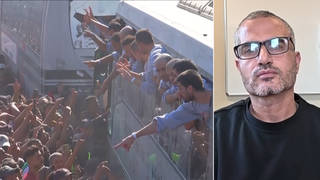
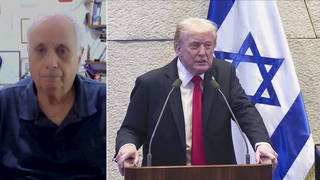
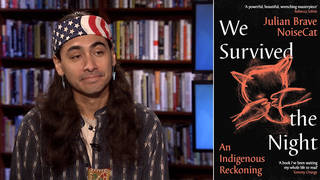





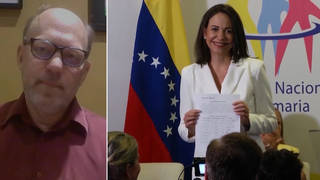
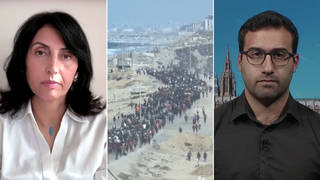
Media Options